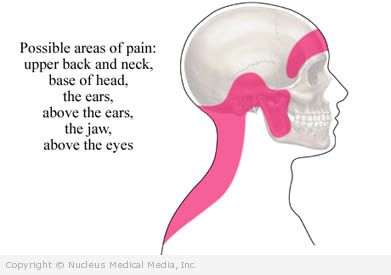Tension Headache
(Muscle Contraction Headache; Tension-Type Headache)
Tension headache – Definition
Tension headache refers to head pain associated with stress and muscle contraction. These headaches may occur only occasionally in response to a stressful event. They may also be chronic, occurring frequently. Some tension headaches are nearly constant, with daily pain that may vary in intensity.
Tension headache – Causes
Tension headaches may occur when muscles in the neck, face, and scalp contract, which produce pain. The precise cause of this muscle contraction is unknown. Factors that may contribute to tension headache include:
- Stress
- Anxiety
- Depression
- Eyestrain
- Poor posture
- Injuries or arthritis of the neck area
- Temporomandibular joint disease (TMJ)
- Chemical imbalances in the brain
Tension headache – Risk Factors
A risk factor is something that increases your chance of getting a disease or condition. Your risk of getting a tension headache increases with:
- Depression
- Anxiety
- Sex: female
- Teeth clenching or grinding
- Sleep apnea
- Medications
- Sleep disruption
- Low physical activity
- Being Overweight
- Smoking
Tension headache – Symptoms
Tension headache symptoms usually start slowly and build.
Symptoms include:
- Constant, steady pain and pressure
- Dull and achy pain
- Pain felt on both sides of the head, in the forehead, temples, and the back of the head
- Pressure may feel like a tight band around the head
- Intensity ranges from mild to severe and can vary during the day
- Tightness in head and neck muscles
Headaches can become so severe and constant that they interfere with normal activities and sleep.
Tension headache – Diagnosis
The doctor will ask about your symptoms and medical history, and perform a physical exam. The cause of a headache can be difficult to determine.
Tests may include:
- Neurological exam
- Blood tests
- Neck x-ray — a test that uses radiation to take a picture of structures inside the body, especially bones
- CT scan — a type of x-ray that uses a computer to make pictures of structures inside the head
- MRI scan — a type of machine that uses a magnetic field, radio waves, and a computer to make pictures of structures inside the head
Tension headache – Treatment
Tension headaches are managed, rather than cured. Therapies aim to stop the headache and reduce the frequency of future episodes.
Treatment may include:
Medications
Medications may include:
- Over-the-counter pain pills — Continuous use of some over-the-counter medication may create rebound pain when you stop taking the drug. Using these medicines too much can cause headaches. Pain medications are most effective when taken at the first sign of pain and before it becomes severe.
- Prescription nonsteroidal anti-inflammatory drugs (NSAIDs)or muscle relaxants
- Drugs to prevent headaches, if you suffer from daily tension headaches
- Antidepressant medications, even if you are not clinically depressed
- Botulinum toxin injections (Botox)
Self-care During the Headache
Self-care may include:
- Rest.
- Put an ice pack or heat pack on your head or neck to ease discomfort.
- Take a warm shower, with water running over tense muscles.
- Massage your temples and neck.
- Practice relaxation techniques.
Lifestyle Changes
Lifestyle changes may include:
- Exercise regularly.
- Improve your posture.
- Get plenty of sleep.
- Take breaks from tasks.
- Learn and practice stress management and relaxation techniques.
- Consider seeing a counselor to:
- Develop new coping skills.
- Identify events that trigger the headaches and work toward resolution.
Additional Therapies
Additional therapies may include:
- Acupuncture — Acupuncture may help you to have more headache-free days and lessen the intensity of headaches when they do occur.
- Physical therapy — Physical therapists can help you develop a home-exercise program.
- Massage therapy if the pain is in your neck and shoulders
If you are diagnosed with a tension headache, follow your doctor’s instructions.
Tension headache – Prevention
You may be able to reduce the chance of a tension headache by learning how to manage stress. Try the following strategies:
- Keep a diary, marking when headaches occur and what you were doing before they started.
- Learn to recognize what provokes a tension headache.
- Avoid or minimize stressful situations.
- Take frequent breaks to walk or move around.
- Make time for pleasurable activities.
- Practice relaxation techniques, such as deep breathing and focusing on something pleasant.
- Learn techniques for coping with difficult or stressful situations.
- Make time for friends and build a strong support system.
- Go to bed early and get a good night’s sleep.
- Exercise regularly.
- Do not slouch.
- Hold the phone, rather than cradling it on your shoulder, or use a headset.

